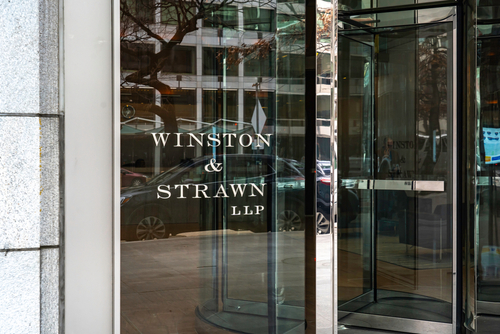BigLaw firm's motion was copied 'nearly verbatim,' boutique firm alleges in copyright lawsuit

A boutique law firm alleges that Winston & Strawn infringed its copyright by filing a motion to dismiss that has a “striking resemblance” to the boutique firm’s motion. Photo from Shutterstock.
Updated: A boutique law firm alleges that Winston & Strawn infringed its copyright by filing a motion to dismiss that has a “striking resemblance” to the boutique firm’s motion.
Winston & Strawn copied the motion “nearly verbatim,” the Hsuanyeh Law Group, a Boston firm, claims in its Dec. 26 lawsuit.
“Defendants did not even rewrite their own introduction,” according to the suit, filed in the U.S. District Court for the Southern District of New York.
Publications with coverage include Above the Law, which noted a social media post about the case by advertising attorney Rob Freund, and the Inner City Press.
The Rule 12 motion filed by the Hsuanyeh Law Group on Aug. 23 sought to dismiss patent infringement claims by Unification Technologies. Winston & Strawn, which represents a co-defendant, filed its Rule 12 motion the next day. The Hsuanyeh Law Group obtained a copyright for the motion Aug. 30.
The Hsuanyeh Law Group seeks actual and statutory damages, noting that the maximum statutory damage for copyright infringement is $150,000.
The suit includes a copy of a Dec. 15 letter signed by Brant C. Weidner, Winston & Strawn’s assistant general counsel.
Weidner said the threatened copyright claim “suffers from numerous substantive infirmities,” but he wanted to focus on the claim for statutory damages of up to $150,000.
Because the Hsuanyeh Law Group obtained the copyright after the alleged copying, the Hsuanyeh Law Group can only recover if the motion was “published” before registration, Weidner wrote. But filing a document in federal court through PACER doesn’t constitute publication within the meaning of the copyright act, Weidner said.
A publication requires commercial advantage, which doesn’t happen with a PACER filing, Weidner said. At best, the filing constituted a “public display” of the motion, he said. And even if statutory damages were available, the most that could be recovered would be $30,000 for nonwillful infringement, Weidner asserted.
“You will not be able to show willfulness in this matter,” Weidner wrote. “Indeed, no case has ever held that a law firm’s copying of a co-defendant’s motion constitutes infringement.”
Cases cited by the Hsuanyeh Law Group involved Westlaw’s use of publicly filed briefs, held to be fair use, and copying from a draft brief that hadn’t been filed, according to Above the Law.
A Winston & Strawn spokesperson declined to comment.
Updated Jan. 3 at 1:14 p.m. to reflect that a Winston & Strawn spokesperson declined to comment to the ABA Journal.



